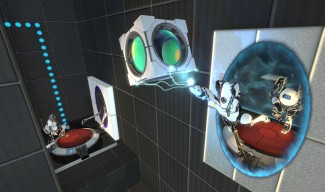If you want to improve your aerobic capacity, play full-court basketball instead of softball. If you want to improve your analytical skills learn to play chess or bridge, not Chutes and Ladders. If you really want to improve your aerobic conditioning or your analytical skills, play against people who are better than you, and see if they’ll teach you a few tricks. If you want to use video games to improve your child’s problem-solving skills and performance at school, you’ll need to choose the right games, ensure they are challenging enough, and — most importantly — connect the skills used in them to real-world situations and academic tasks.
This process is known as the generalization of learning.
 As we’ve said before, not all video games are created equally. Some, like Portal 2, clearly challenge cognitive capacities such as thinking ahead and adapting to problems. Action-based games, such as Halo and Call of Duty, challenge players’ capacity to increase the speed in which visual information is processed, which has been demonstrated to improve processing speed in other activities. Games that demand less-intensive concentration, on the other hand, appear too have limited cognitive benefits when compared to more mentally-tasking games.
As we’ve said before, not all video games are created equally. Some, like Portal 2, clearly challenge cognitive capacities such as thinking ahead and adapting to problems. Action-based games, such as Halo and Call of Duty, challenge players’ capacity to increase the speed in which visual information is processed, which has been demonstrated to improve processing speed in other activities. Games that demand less-intensive concentration, on the other hand, appear too have limited cognitive benefits when compared to more mentally-tasking games.
Just because video game play can improve a cognitive skill, however, doesn’t mean the skills practiced in the game can be easily generalized and applied to other real-world tasks. In other words, improving your Planning skills while playing Portal 2 doesn’t mean you will necessarily display flawless preparation when it comes time to get your child’s birthday party together, or have a perfect menu for your next dinner party. Just like the near-perfect swing you practice at your golf lessons doesn’t ensure great shots at every hole on the golf course, the generalization of skills and the application of their benefits is an uneven and sometimes frustrating process.
So, if you’re looking to better apply those golf lessons next time you tee up for a swing, or want to boost your child’s ability to generalize game-based learning to the real world, you can follow a number of tried and true approaches. These include:
- Target problem areas. Find the best games to practice the identified skills. If your child is disorganized, look for games such as RPGs (role-playing games) that require sequencing or accumulating items or coins to purchase supplies.
- Embrace variety. Practice the skills you want to improve in a variety of ways. If you want to improve your iron game in golf, you’ll need to vary your distance, whether you are hitting from the fairway, the rough, or a sand trap and learn to hit with loft to go over obstacles. In video games, practicing the same skill with a variety of games improves the chance that the player will be able to apply it to new situations he encounters in his daily activities.
- Learn by trial-and-error. Generalization requires that you learn from your mistakes, so your child should play increasingly challenging games where initial failure is common. Just like you might have to practice hitting from the rough before finding the best technique and club, players can use metacognitive skills to reassess their strategies and therefore learn new skills in game play.
- Be willing to ask for help. If you can get your child to recognize her need to improve a specific skill, she may be more willing to look for ways that she can practice and master the skill in her gameplay and ask for your help in applying it outside of the game.
- Use multiple modalities for practice. Generalization works best when practice occurs across settings and with a variety of tools. Video game play is only one tool, albeit a fun and engaging approach, to mastering thinking and academic skills. Encourage strategies such as observation, modeling, shadowing, rehearsal, visualizing, and self-instruction. Then make sure they try out their newly acquired skills in the real world.
PART OF OUR SERIES ON GAME-BASED LEARNING AND GENERALIZATION:
Part I: Learning with Video Games — It’s all about Generalization.
Part II: How to Improve Game-Based Learning with Generalization
Part III: Generalization & Game-Based Learning: What Parents & Educators Need to Know
Featured image: Flickr user Rennan Quijano




